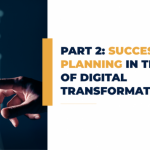Covid-19 and The Impact
“I thought productivity is supposed to drop when you work from home, how come we are working a lot more?”
In a catch up with his team lead, one of my colleagues innocently quipped. While we all found it hilarious, it also piqued my curiosity. Are we just lucky at Accendo, that we were mostly born as an organisation in the Digital Native timeframe, or did we build the mindset needed to behave in this way?
That led me to think of organisations that we not born in the digitally native era and how they are progressing in these times.
If nothing else, this pandemic has shown us that people around the world are adaptable, agile and most glaringly – resilient, together. From New York to Florance, China to Australia, people have come together to redefine what the new normal (yes, I am aware this is over-used) is.
How is it, that the COVID-19 pandemic we face today has served as a stimulus to what we perceive as Digitisation. What happened to “We don’t think we need this now” or “This is just nice to have… not essential”. There are even memes going around allotting the credit of digitisation to COVID over that of the CIO or CTO.
“How is it, that the COVID-19 pandemic we face today has served as a stimulus to what we perceive as Digitisation.“
Tools such as Microsoft teams, G-Suite, Zoom are surely helping the scenario but we are also aware that these tools are mere enablers. What about people’s readiness to execute continuously and to hold the stamina required to be “digitally effective”?
In my humble opinion, just having the tools in place to work “Anywhere, Anytime” is not the true north for a digital workforce. I opine the real true north, in this case, is the decision quality, speed of execution and levels of productivity.
“I opine the real true north, in this case, is the decision quality, speed of execution and levels of productivity.“
This is the very framework of a digital workforce. When talking about building a digital strategy, I have seen companies spend millions blindly investing in technology without having a real sense of measurement of the Readiness of the people to adopt these new practices. “Create and they will adopt” may work for Apple, Google, and Tesla but unfortunately, most companies do not have the discipline to rigorously hire and groom talent as they do.
“Create and they will adopt” may work for Apple, Google, and Tesla but unfortunately, most companies do not have the discipline to rigorously hire and groom talent as they do.“
I keep talking about “Readiness” – why? Because without knowing where you are now, there is no point trying to figure out “How to get to a new place” or “Where this new place is” and this means leaning into data as a true digital business would.

Why are we afraid of our data at work?
In every aspect of our lives today, data plays an important role in deciding what we eat, what music we listen to or even what news we see.
Algorithms have been quietly ruling our lives for over a decade now. Do you think the news you see on Facebook or Google is neutral? Think again. Algorithms go through what we like, what we read, glance over and what we ignore in order to place in front of us news that is aligned to our belief system. This is not me ringing the Zeitgeist alarm; this is just the way algorithms works – the confirmatory bias*.
“In every aspect of our lives today, data plays an important role in deciding what we eat, what music we listen to or even what news we see.“
On the other hand, when I see how low the bar is set with regards to the data we are willing to share publicly and the lack of trust deficit we have for Social Media, I wonder why people are so willing to “expose” one’s life to companies who then use this data to form opinions of us?
But this very “us” is not willing to do the same when information is asked of us at our workplace. Suddenly, data becomes private. The very same person who will expose all the most intimate moments of their life on social media will not share the most basic info at work.

Why? Where did the trust deficit go?
Then, it struck me. Social Media has always been a form of expression and appreciation. Fake as it may be to some, we want to display a version of ourselves there because we get to control how and what we display and we, to some extend are already aware of the outcome – Likes, Shares, Views – all these leading to a hit of dopamine in our brain which according to Simon Sinek, a study at Harvard proved that 8hours of social media a week is equivalent to the same amount of dopamine a crack addict gets in a shot. We are consuming digital crack.
Unfortunately, when I share data of me at work, it is always used against me. Lesser bonus, no promotion, criticism of my poor performance and on and on. This is why, even after spending tens of millions of dollars on huge HRMS systems, we still cannot seem to get the most basic information right. Josh Bersin in one of his papers put it nicely, “I’ve talked with multiple CHROs who have spent many millions of dollars on replacement core HCM systems, only to find out that the employee experience fell short and required a new layer of software on top.”**
“I’ve talked with multiple CHROs who have spent many millions of dollars on replacement core HCM systems, only to find out that the employee experience fell short and required a new layer of software on top.“- Josh Bersin

Why do professional athletes rely on data to make their work better?
I take a lot of inspiration from sports. I always think of myself as a huge amateur sports enthusiast; one who enjoys studying every little detail about it. In studying football, cycling, badminton and many other sports, it had become evident as daylight that they all seem to understand how data can be used to consistently improve their performance – one small step at a time.
In building the case for incremental improvements, Fernando Torres once said in response to an interviewer’s question about how he has become so prolific, that all he does is listen to Rafa Benitez because after looking at some sheets and screens he (Rafa) tells him where to stand and the balls seem to keep coming there and he keeps scoring.
Chris Froome blew up Stage 19 of the Giro D’Italia doing something no one thought was ever possible (if you are interested, please watch this link. It is mind-blowing how science was used to enable the human performance)
Usain Bolt in the run-up to his Olympics World Record used an immense amount of data to better his “off the block” segment of this sprint.
I can keep going with examples where is it the norm (not the exception) to use data to better ones’ self. So why do we not do the same at work? Why do managers punish the “athletes” when there is data? Why not use it to find ways to better the individual and by bettering the individual, you better the team.
I put it to you, that the reason we still do this today is because we are stuck with the old ways of working. One, where the manager has the power and the staff just does what the manager says. I’m sorry, but those days are long gone. The power balance of employment has moved from Employers to Employees. The organisation that will thrive is the organisation that understands how to build “Talent Experiences”. Those that are still determined to hold on to nostalgia may as well prepare to be nostalgia.
We, collectively, spend more time at work than anything else we do in our lives. Is it not incumbent upon the leaders to make sure that the people that work with us are provided with an environment they can thrive in? There is sufficient data to show that when parents go home frustrated from work it increases the likelihood of their kids becoming bullies in school***. As an irresponsible leader, we are contributorily negligent in committing these crimes – vicariously through the kids of our colleagues that we mistreat.
Is it too much to ask that from now, organisations start thinking more like sports teams in knowing that the best use of the data we collect about our people should be used primarily do develop them, re-skill and up-skill them, predict movements so you can help them and understand their best position so they can contribute immensely back to your organisation?
Reference
*https://www.frontiersin.org/articles/10.3389/fdata.2019.00011/full
**https://oliver-dev.s3.amazonaws.com/2019/01/27/12/54/25/916/Tech_Disruptions.pdf
***https://www.ncbi.nlm.nih.gov/pmc/articles/PMC3519332/
Page Contents






